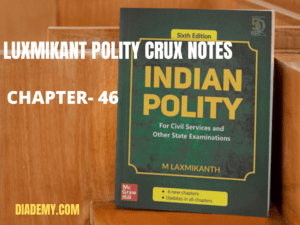
Goods and Services Tax Council
| Establishment of the Council | · 101st Amendment Act of 2016 – Introduction of a new tax regime – GST
· Inserted new Article 279-A in the Constitution · Empowered Parliament to constitute a GST Council – Secretariat in New Delhi. · Union Revenue Secretary – ex-officio Secretary of Council |
| Vision and Mission | Vision: “This tablet is the highest standards of cooperative federation in the current functioning of the council, which is the first constitutional federal body vested with powers to take all major decisions relating to GST.”
Mission: “evolving by a process of wider consultation, a GST structure, which is information technology driven and user-friendly” |
| Composition of the Council | a. Union Finance Minister – Chairperson.
b. Union Minister of State in charge of revenue or finance. c. Minister in charge of finance or taxation or any other minister nominated by each state government Members of the council have to choose the vice chairperson of the council – also decide his term. Union Cabinet also include chairperson of Central board of excise and custom as permanent invitee non-voting to all proceedings of the council. |
| Working of the Council | · Decisions of the council are taken at this meeting – half of the total number of member of council is the quorum
· Decision taken by: a. Vote of CG 1/ third weightage. b. Vote of SG 2/3 weightage · Act or any proceedings will not become invalid on following grounds: a. Any vacancy or defeat in the constitution of the council. b. Any defect in the appointment of a person as a member of the council. c. Any procedural irregularity of the council not affecting the merits of the case. |
| Functions of the Council | Council make recommendations of the following:
1. Tax, cess and surcharge levied by the Centre, state and local bodies merged with GST 2. Goods and services may be subjected or exempted from GST. 3. Model GST law principles of levy apportionment and principles that govern the place of supply 4. Threshold limit of turnover below which goods and services may be exempted from GST. 5. Rates + floor rates 6. Special provisions wrt certain states 7. Ay other matter relating to GST as Council may decide. |
| Other Functions | 1. Commencement date on which GST may be levied on petroleum crude, high speed diesel, motor spirit, natural gas and aviation turbine fuel
2. Disputes address and adjudication mechanism 3. Recommend compensation for revenue loss to states |
Get all essential Crux notes by clicking here https://diademy.com/product/staticcrux/